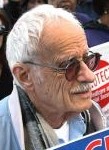Submitted by Marvin Miller
 Liberty and property are subjects for ethical discussion. Your ethical values justify your ideas about who should have which liberties and who should own what property.
Liberty and property are subjects for ethical discussion. Your ethical values justify your ideas about who should have which liberties and who should own what property.
Property enhances and restricts liberty. Ownership enhances the liberty of the owner to use the property while restricting the liberty of everyone else to do so. Woody Guthrie didn’t think the owner of the land ought to have the right to keep him from walking on it.
Property is a relationship between owner(s) and owned, established by government and custom, not by any god or nature. Transfers of land ownership are recorded at the Registry of Deeds. By universal custom, property you carry is presumed to be yours to do with as you choose. If a robber steals cash and later offers to buy something with it, he is presumed to be its owner unless proven otherwise.
In this hemisphere, and very likely everywhere else, all deeds of land ownership, including, of course, the land on which all our homes stand, if traced back far enough, stem from an act of armed seizure.
The American Indians may not have had the practice of assigning specific bits of land to individual owners, but they regarded regions of land as belonging to the tribes that lived there.
Private property either is privatized public wealth or it originated on previously privatized property. Privatization is an act of government that changes the status of wealth to private property, generally for the advantage of someone favored by the privatizer. According to my encyclopedia, William Penn, the father of the founder of Pennsylvania, was a pirate, authorized by the English government to prey on the shipping of residents of other countries. He loaned some of the proceeds of his loot to the English king, who later paid off the debt by granting Pennsylvania to his son.
How did the king get the authority to dispose of Pennsylvania? Armed seizure, which deprived the Indians of the liberty to be there.
From 1619 to 1865, Africans and their descendants in this country were regarded not as people with the right to liberty, but as property of others. The legacy of that attitude is still with us in some people’s minds, sometimes with deadly consequences.
A woman’s liberty, her right to go where she chooses, to own property, and not to be considered the property of a man, had to be won through political struggle, yet it is still not recognized everywhere in the world.
Pierre-Joseph Proudhon, the 19th century writer, said “Property is theft.” That’s true for property not obtained in exchange for something of equal or greater value, that is, for most of the world’s property. Your ethical values will inform your conclusions about the legitimacy of such property and its effect on everyone’s liberties.
